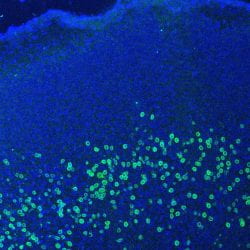Research
 Neurodevelopmental functions of autism risk genes
Neurodevelopmental functions of autism risk genes
The majority of autism risk genes encode proteins involved in gene regulation; chromatin regulator proteins contain numerous de novo loss of function mutations in children with autism. Identifying common mechanisms and downstream targets of these chromatin regulators is important to understand the pathophysiology of autism and to develop possible therapies. The lab uses mouse and human models to discover developmental phenotypes caused by mutations in chromatin regulators.
 Evolution and brain function of transposable elements
Evolution and brain function of transposable elements
The human genome contains many transcription factors that evolved from transposons; the activity of the transposase domains of many of these proteins is still unknown. The lab is studying the evolution and function of the autism risk gene POGZ and other transposon-derived transcription factors using in vitro and in vivo methods.

Developmental regulation of ion channel genes
The combination of ion channel genes a neuron expresses determines its firing behavior and excitability. This is a gene regulation problem that is solved during development by a developing neuron. The lab is studying the epigenetic regulation of the potassium channel gene family in cortical neuron development, and their dysregulation in autism and epilepsy.
